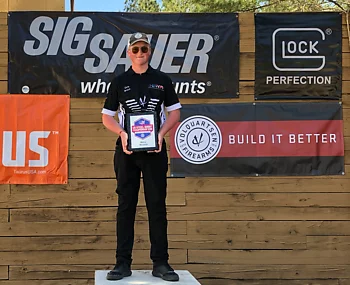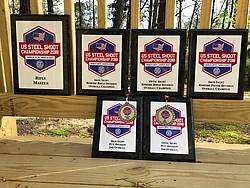How to Prep for a Big Match

If there is one thing that I have learned from talking and working with some of the best competitive shooters in the world, it is that the most successful shooters start preparing for a match long before the actual event. There is more to competing at the highest levels than just showing up on match day.
After his success this past weekend finishing first in rimfire rifle, second in PCC, and 6th in rimfire pistol at the US Steel Shoot Championship, we decided to ask 15 year-old Cole Busch how he gets ready for a big match.
Here is how he gets ready for a major match:
When preparing for a major match, I try to research the previous year's event on the internet so I can familiarize myself with the location of the match. Once we determine the hotel we are staying at, I look for places we will be able to pick up any last minute supplies, eat, and be prepared for anything else that may come up.
 Once that is done and my registration is complete, it's time to practice. My practice sessions focus on shooting fundamentals and if the match director has provided the stage diagrams I will break those down. Shooting fundamentals are critical to any type of firearms competition. If I know I am shooting a Steel Challenge match I will practice the stages I am not as good at. My Dad instilled the value of dryfire practice and visualization, and I will spend up to one hour a day doing that.
Once that is done and my registration is complete, it's time to practice. My practice sessions focus on shooting fundamentals and if the match director has provided the stage diagrams I will break those down. Shooting fundamentals are critical to any type of firearms competition. If I know I am shooting a Steel Challenge match I will practice the stages I am not as good at. My Dad instilled the value of dryfire practice and visualization, and I will spend up to one hour a day doing that.
My live fire practice consists of 10 to 15 dry runs of the stage. My first live runs are 75% of my max speed. If I am hitting each plate I will pick up the pace on each string. I will work on the transition from start to first plate with any remaining rounds in the magazine. It is important to hit the first plate in practice and competition. I feel hitting that first plate in rhythm sets the tone for the rest of the stage.
My Dad and I use an electronic timer to record my start stake to first plate times as well as each full string. I will determine how hard I will push the next string based on the previous one. If I am missing one plate consistently I will slow down slightly to insure a hit on the remaining strings. It is important to visualize yourself hitting each plate on every string.
Our final preparation for each match consists of cleaning and inspecting each gun. Once that is completed I do a function check and confirm zero. After that is completed I will use a checklist and go through all of my range gear and equipment.
On the competition day I like to arrive at least one hour early. Doing this gives me time to sign in, look at the stages, and visualize how I will shoot them. After that I focus on shooting my match, encouraging my fellow competitors, and having fun!"
Thank you to Cole for taking time to provide his insight on match preparation. Be sure and follow Cole's 2018 shooting season on Instagram.
Please keep in mind this level of practice and preparation is not a prerequisite for competeting in your first match. However, if your goal is to shoot and compete with the very best in the sport it will take dedication to do so.
|





